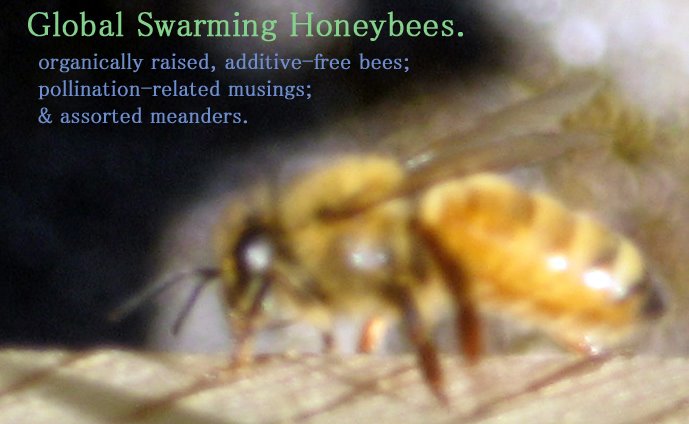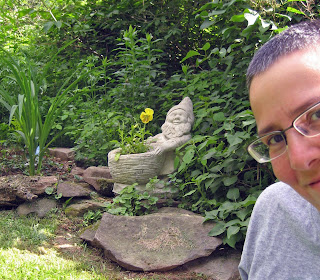Reprinted here with kind permission from the author, is an essay I relished and am delighted to to share. Thanks, Sam, for bringing this gem my attention. The photo below is titled "Bee Yard, Jan 1979," and shows the hives kept by Sam and Jason's dad. Location: Near Mount Vernon, Iowa.
I WAS STUNG ONCE
I was stung once, but only once, in the five-plus years my father kept bees. I was ten, and my face was at most three feet from a swarm clustered on a sapling. Bees are fairly docile when swarming, so the problem wasn't my location but my reaction to an errant bee landing on my cheek. I slapped it, even though I knew better, and it stung me. Then I panicked and ran, even though I knew better, until my dad stopped me and scraped out the stinger. I was fine by the next morning, of course, and had no hard feelings toward the poor creature who had died in the act of stinging.
There were no real dangers in living so close to so many bees—my tree house was fifty feet from at least 20 hives. Instead, sharing that space offered rare pleasures, privileges I hope to earn again one day.
The most obvious was the abundance of excellent honey. We had gallons of it—more than our family could ever enjoy, even though we enjoyed honey more than most. Dad sold some, and we gave much of it away as a gift. Relations, friends, teachers, and bus drivers were at least annually given beautiful, dusky, amber quarts of a honey that in some years united the tang of alfalfa and the smooth sweetness of clover. In our basement were sometimes scores of gallon milk jugs full of it. (The last harvest from those hives was, I think, in 1983; I finished the last jar I had from that year in 2001.)
Another pleasure was the extraction of the honey and comb from the hives. I was never involved in bringing the honeycomb in from the hives, but I sometimes helped, while my patience held, in the removal of the honey itself. My mind will always carry the gleam of the stainless steel centrifugal extractor; the aroma of honeycomb yielding in the warming tub; the taste of a mouthful of honey-laden comb straight from the hive; and the hum of bees flying confused circles in our garage as the sun went down.
All around the culture of beekeeping is an air of humility before these small creatures. The life of the hive is extraordinarily complex, and every beekeeping book I've ever read is quick to point out how apiculture often becomes about much more than maximizing honeyflow. Even a straightforward introduction to the discipline like Keeping Bees is full of passages like the following, about getting acquainted with a newly-acquired bees:
Once they've had a cup or two syrup, they'll be happy and you can play around with them for a bit to get used to having bees in your life. A little familiarity will eliminate the fear we all have of stinging insects.
Pour a puddle of syrup through the screen and shake some bees into it. . . . Watch their little tongues go at the syrup. Touch the feet and antenna of bees crawling inside the cage wire. They can't sting through the wire. Blow on a cluster and see what it does. Poke a broom straw through the wire and into the bees. Stir them gently. Fast movement will meet with antagonism. Slow, gentle movement won't be noticed. You are learning two major skills of bee handling: do nothing until you feel safe—have confidence born of know-how—and do everything in a slow, gentle, and deliberate manner.
And again:
Try to decide your top priority [in keeping bees]. Are you keeping bees primarily to harvest the honey, or is the honey a justification (if you need one) for keeping the bees? If you pick the former, I look forward to reading of your 500-pound record in the coming issue of the bee magazines. If you pick the latter, that's two of us.
Here's a passage typical of the very fine The Queen Must Die:
There are said to be at least five thousand species of wild bees in North America alone, but little is known about them. When creatures have little or no commercial value, if they are neither especially harmful nor useful and not strikingly beautiful, fascinating, or bizarre, they are largely ignored to go their own way. This also holds true of most people of little or no distinction.
Growing up among bees, and with a beekeeper, has given me many gifts, even if I am a little late in appreciating some of them. I'm endlessly grateful for the chance I had to watch my father and a few hundred thousand bees work together.
—by Jason Streed
6.10.2008
I Was Stung Once, by Jason Streed
Labels:
beekeepers,
beekeeping,
childhood,
stings
Subscribe to:
Post Comments (Atom)





No comments:
Post a Comment